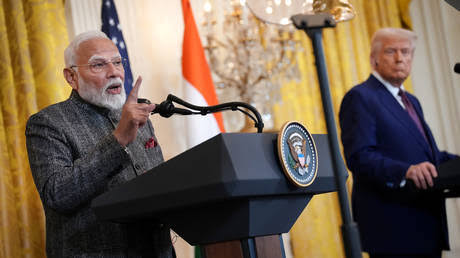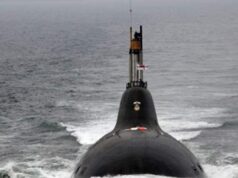India will never accept third-party mediation on Kashmir dispute

The terrorist strike in Pahalgam this April finally compelled India to carry out airstrikes on confirmed terrorists infrastructure in Pakistan-Occupied Kashmir and also inside Pakistan itself. The precision strikes in first week of May2025 were a direct response to the terror attack by Pakistan-based terror groups.
No Pakistani military bases were targeted. However Islamabad responded with its military actions but got whacked badly in the brief period of escalated conflict. The situation was eventually defused by May 10, when accepting the plea of Paki DGMO for a ceasefire India too announced a ceasefire.
Following the de-escalation, President Trump quickly, dramatically and publicly claimed that he had played a role in mediating the ceasefire. “We used trade. It worked. They stood down,” Trump stated with a straight face, snidely hinting to US leverage over India through economic negotiations and military relations.
The glee displayed by Modi baiters and Modi haters was short lived when In a decisive and unambiguous assertion Prime Minister Narendra Modi reiterated and countered Donald Trump that New Delhi “has never accepted, does not accept, and will never accept” any form of third-party mediation in the Kashmir dispute with Pakistan. The statement was made during a 35-minute telephone call on June 18, initiated by the United States following President Trump’s early departure from the G7 summit in Canada.
India’s stance on the matter is not new. However, Modi’s latest reaffirmation is being seen as a pointed response to recent developments, including the US president’s repeated claims of having helped broker a ceasefire between India and Pakistan in May.
According to Indian Foreign Secretary Vikram Misri, the prime minister made it “absolutely clear” during the conversation that Kashmir remains a bilateral issue and will continue to be addressed strictly between New Delhi and Islamabad.
“There is complete political unanimity in India on this,” Misri emphasized at a press briefing held in New Delhi on June 18. “No Indian government has ever accepted the idea of third-party mediation in Kashmir, and that position is non-negotiable.”
New Delhi, firmly denied and debunked this narrative. Foreign Secretary Vikram Misri confirmed that Modi made it clear to Trump during their phone call that no trade deal or foreign mediation was involved in the cessation of hostilities. “The ceasefire was a result of direct communications between the concerned parties. India acted in its sovereign interest and remains capable of handling such situations independently,” Misri said.
The timing of the call and the surrounding choreography displayed by the Americans, the Pakis and a few Indian Opposition leaders have drawn considerable attention. Just days after the ceasefire, Pakistan’s powerful military chief, General Syed Asim Munir, travelled to the United States for meetings with senior American officials, including a scheduled lunch with President Trump. The juxtaposition of these events has led some analysts with vested interests to speculate on Washington’s intentions in the region.
While Trump has historically positioned himself as a dealmaker in global conflicts, his overtures towards Kashmir have been outright rebuffed by New Delhi. His past remarks in 2019-claiming that Modi had asked him to mediate on Kashmir-were met with swift and public denials from the Indian government.
The latest round of US involvement appears to have triggered another firm response from India, aimed at dispelling any notion that the United States can serve as an intermediary between India and Pakistan.
In the same phone call, Trump reportedly extended an informal invitation to Prime Minister Modi to visit the United States following the G7 summit. However, the Indian leader declined due to “prior commitments,” according to Misri. This diplomatic response underscores India’s clear approach to managing its relationship with Washington amid complex regional and global happenings.
While India and the US share strong strategic and economic ties, the issue of Kashmir remains a red line for New Delhi in its foreign relations. India has consistently maintained that the 1972 Shimla Agreement, signed with Pakistan, forms the basis of all bilateral dialogue and precludes any third-party involvement.
One of the key points stressed by Foreign Secretary Misri was the existence of an “absolute political consensus” across the Indian political spectrum regarding non-intervention in Kashmir. Regardless of ruling party or opposition, the position has been consistent for decades: the resolution of Kashmir-related issues must come through direct negotiations between India and Pakistan alone.
This clarity is especially important given the recent uptick in international interest of a few countries in the Kashmir issue. Amid growing global focus on regional security, particularly as China tries to increase its influence in South Asia, India’s reiteration of its policy serves as both a reminder and a warning to external actors.
India’s refusal to accept any form of mediation in Kashmir is not merely a matter of national pride; it is a cornerstone of the country’s diplomatic philosophy. The latest reaffirmation by Prime Minister Modi, giving priority to Croatia visit over a visit to Washington is a continuation of this principle.
Trump soon changed his stance and publically announced that Ceasefire announced by India had nothing to do with him or his Government ……what a dramatic U TURN.
As the geopolitical chessboard continues to evolve-with China’s assertiveness and India’s uncompromising actions to defend its national interests, the US’s fluctuating foreign policy, and Pakistan’s “Tabaqui” maneuverings-India’s insistence on bilateralism in handling Kashmir serves as a consistent signal to the international community.
Despite blabbering by Khalifa Erdogan / a few in the EU to “resolve” the Kashmir issue, India’s message remains unambiguous: dialogue, if any, will be on its terms and with Pakistan alone-no exceptions.




